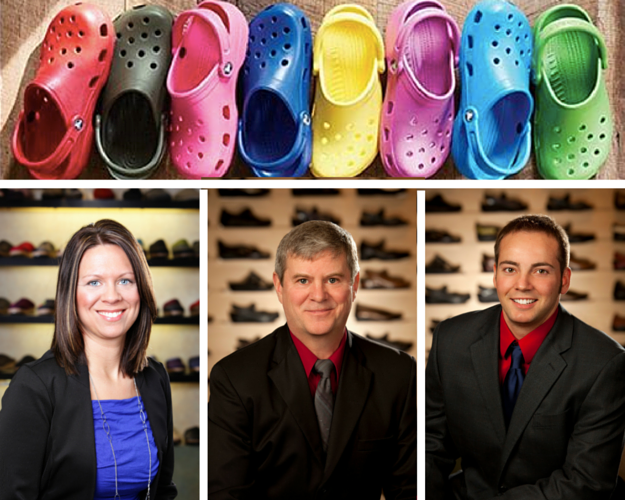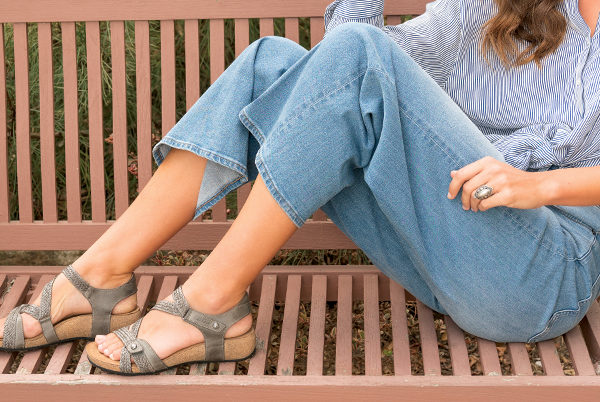From the Huffington Post to US Today to Cosmopolitan, Crocs have gotten plenty of coverage over the past few days. The question everyone wants to know: are Crocs bad for your feet? Our Certified Pedorthists* (C.Peds) weigh in to explain their take on the rubbery clogs.

Three of our Certified Pedorthists weigh in about Crocs. (Left to right) Morynn Marx, Steve LaFond, and Lance Vidger. Shoe image via Crocs
Crocs Can Impair Important Neurological Functions
The bottoms of our feet contain many nerve receptors that communicate with our brain to transmit sensations, stimulate muscle contractions, and, importantly, maintain balance. According to Morynn Marx, C.Ped at our Maple Grove store, Crocs are very sensory depriving. The materials they’re made of (Croslite™, a resin that gives a soft, lightweight feel) blind the receptors on the bottom of our feet that send signals to the ground. The result? A loss of balance that can cause people to trip and fall.
Crocs Worn By Young Children Can Lead to Foot Issues

Crocs can impair our feet’s neurological receptors. This is a special concern for kid’s growing feet.
Our C.Peds unanimously agree that Crocs are especially bad for younger children’s developing feet. When they can’t feel the ground, children are not only at a greater risk for falls and injuries, but also neurological and intrinsic muscle impairments that can lead to foot issues later in life. As far as whether or not older kids should wear Crocs, Marx says it depends. Some may have no issues while others struggle with balance and falls. Determine what works best for your kid. If you have any questions, feel free to schedule an appointment with a C.Ped at any of our nine locations.
Crocs Can Cause Our Bodies to Overcompensate
Steve LaFond, C.Ped at our Wayzata store, points out that Crocs have a tendency to wobble back and forth. This is in part due to the unstable heel. In an interview with the Huffington Post, Megan Leahy, a podiatrist with the Illinois Bone and Joint Institute, identifies foot issues that can arise when the heel is not properly secured in shoes and our toes are forced to grip:
- -Tendinitis
- -Worsening of toe deformities
- -Nail problems
- -Corns
- -Calluses
Excess cushioning also makes it more difficult to gain a solid footing in Crocs. In LaFond’s opinion, wearing the rubbery clogs is like “walking through loose, dry sand” or “walking on marshmallows”. And that’s a problem. Too much cushioning can compromise our feet’s ability to absorb step impact since there is no stable foundation to push back against. As a result, our feet, ankles, and knees have to work a lot harder. This puts us at a greater risk for overuse injuries or strains.
When it comes to shoes, there is such thing as too much cushioning. Via GIPHY
Crocs Tend to Have a Loose Fit
For Lance Vidger, C.Ped at our Burnsville store, the main issue with Crocs is the way they fit: “Crocs are generally too wide for most people,” he says. This loose fit contributes to the overall lack of stability that can cause blistering, tripping, and excessive toe gripping.
What Our CPEDs Like About Crocs
Although none of the C.Peds interviewed would necessarily recommend Crocs, there are situations where use would be appropriate for older kids who don’t struggle with falling and adults. Vidger says Crocs are fine to wear beside a pool or lake, or to slip on for quick errands like grabbing the mail. The key is to not wear them for prolonged periods of time since the lack of stability could increase chances for fatigue and injuries.

Further pros our C.Peds pointed out:
- -Crocs are foot-shaped which allows for more natural muscle and foot functionality.
- -Crocs provide plenty of toe room.
- -Crocs protect your feet from debris and hot surfaces.
- -Crocs tend to be very grippy and some are even rated slip-resistant for wet surfaces.
- -Crocs are easy to clean.
- -Crocs can be a great option for someone who has an especially wide or swollen foot that won’t allow for other types of footwear.
Conclusion
For older kids and adults, wearing Crocs for short periods of time is not necessarily “bad” for your feet. However, wearers should be aware that impairment of neurological functions, an unstable heel, excess cushioning, and a loose fit can contribute to tripping and overuse injuries.
When it comes to younger children, our CPED’s don’t recommend Crocs. In addition to instability factors that can lead to injuries, Crocs can disrupt normal foot development and neurological functioning in growing feet.
*Certified Pedorthists receive special training and a certification in lower limb anatomy, biomechanics, and the use of corrective footwear and foot devices. They are not doctors and do not diagnose. The views expressed are the opinions of our in-store CPEDs. For medical advice, please consult your doctor.
To see our Certified Pedorthist’s walk-in schedules or set up an appointment, visit: schulershoes.com/evaluations

